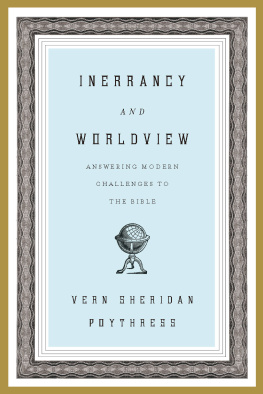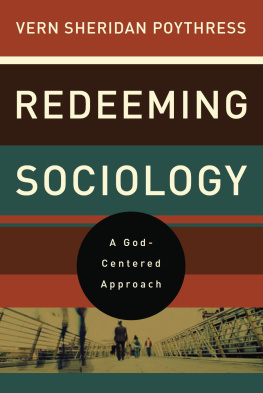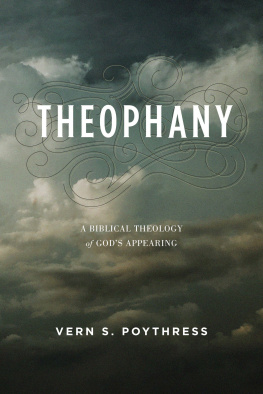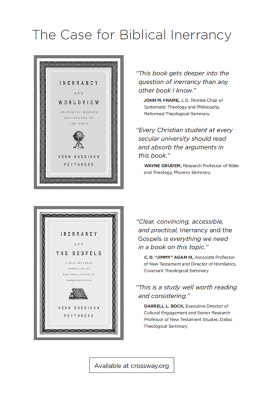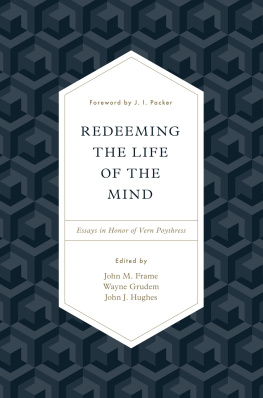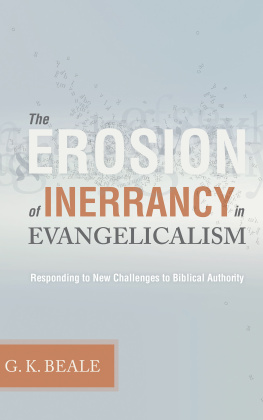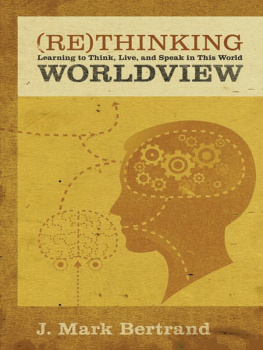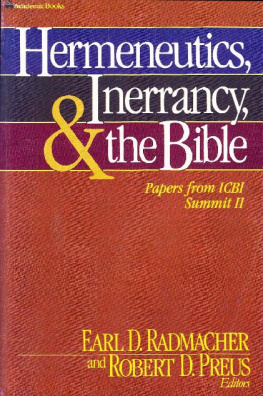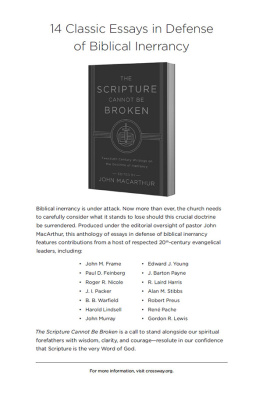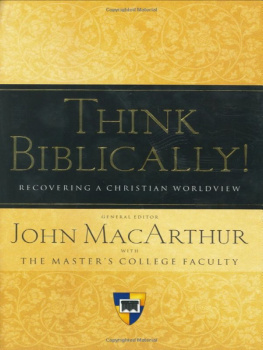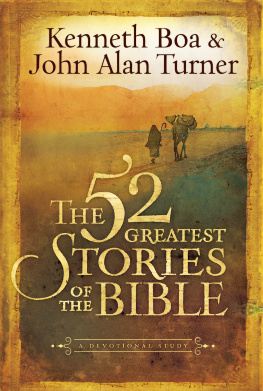Inerrancy and Worldview: Answering Modern Challenges to the Bible
Copyright 2012 by Vern Sheridan Poythress
Published by Crossway
| 1300 Crescent Street |
| Wheaton, Illinois 60187 |
All rights reserved. No part of this publication may be reproduced, stored in a retrieval system, or transmitted in any form by any means, electronic, mechanical, photocopy, recording, or otherwise, without the prior permission of the publisher, except as provided for by USA copyright law.
Cover design: Studio Gearbox
Cover image(s): Dover
Interior design and typesetting: Lakeside Design Plus
First printing 2012
Printed in the United States of America
Scripture quotations are from the ESV Bible (The Holy Bible, English Standard Version), copyright 2001 by Crossway. Used by permission. All rights reserved.
All emphases in Scripture quotations have been added by the author.
Trade paperback ISBN: 978-1-4335-2387-8
ePub ISBN: 978-1-4335-2390-8
PDF ISBN: 978-1-4335-2388-5
Mobipocket ISBN: 978-1-4335-2389-2
Library of Congress Cataloging-in-Publication Data
Poythress, Vern S.
Inerrancy and worldview : answering modern challenges to the Bible / Vern Sheridan Poythress.
p. cm.
Includes bibliographical references (p. ) and index.
ISBN 978-1-4335-2387-8 (tp)
1. BibleEvidences, authority, etc. 2. Apologetics. 3. Christian philosophy. 4. ChristianityPhilosophy. I. Title.
BS480.P66 2012 |
220.1'32dc23 |
2012001926 |
Crossway is a publishing ministry of Good News Publishers.
VP 24 23 22 21 20 19 18 17 16 15 14 13 12
14 13 12 11 10 9 8 7 6 5 4 3 2 1
To my wife,
who has faithfully encouraged me
in trusting Gods Word
How do we understand the Bible? In recent decades a number of books, articles, blogs, and other voices within the broad community of evangelical Christians have urged us to rethink how we understand the Bible. These discussions about the Bible have special interest for evangelicals and fundamentalists who believe that the Bible is the word of God.
Some of the new voices express discontent with the traditional view of the Bibles absolute authority as the word of God. The traditional evangelical view says that the Bible is inerrant; that is, it is completely true in what it says, and makes no claims that are not true.
The struggle about the Bible has many dimensions. Modern challenges come from various directions. We confront postmodernist thinking, alleged discrepancies or errors in the Bible, growing information about the ancient Near East that allegedly throws doubt on traditional readings of the Bible, and tensions between the Bible and science.
I agree that our modern world confronts us with some distinctive challenges. But I do not agree with the modern attempts to abandon or redefine inerrancy. To respond to all the modern voices one by one would be tedious, because the voices are diverse and new voices continue to appear. Rather, I want to develop an alternative response in a positive way.
Some of the new voices tell us that we need to think through more thoroughly the humanity of Scripture. The Bible itself identifies some of the human authors who wrote its booksfor example, Paul, John, Jeremiah, Amos. It also indicates that the writing of the books was superintended by God, and that God sent the Holy Spirit to the human authors to work in them in such a way that their writings were also Gods writings, his own word (2 Tim. 3:16; 2 Pet. 1:21). Thus, the Bible does invite us to think about the human authors and what they did. But we are unlikely to appreciate the role of human authors accurately and in depth without understanding God, who made human beings in his image (Gen. 1:2627).
The Bible has much to say about God and about how we can come to know him. What it says is deeply at odds with much of the thinking in the modern world. And this fundamental difference generates differences in many other areasdifferences in peoples whole view of the world. Modern worldviews are at odds with the worldview put forward in the Bible. This difference in worldviews creates obstacles when modern people read and study the Bible. People come to the Bible with expectations that do not fit the Bible, and this clash becomes one main reason, though not the only one, why people do not find the Bibles claims acceptable.
Within the scope of a single book we cannot hope to deal with all the difficulties that people encounter. We will concentrate here on difficulties that have ties with the differences in worldview.
I consider fundamentalists to be a subgroup within evangelicals. I grant that the words evangelical and fundamentalist today are rather loosely defined.
The classic statement on inerrancy is found in Benjamin B. Warfield, The Inspiration and Authority of the Bible (Philadelphia: Presbyterian and Reformed, 1948). See also Archibald A. Hodge and Benjamin B. Warfield, Inspiration, with introduction by Roger R. Nicole (Grand Rapids: Baker, 1979); Richard B. Gaffin Jr., Gods Word in Servant-Form: Abraham Kuyper and Herman Bavinck on the Doctrine of Scripture (Jackson, MS: Reformed Academic Press, 2008); John D. Woodbridge, Biblical Authority: A Critique of the Rogers/McKim Proposal (Grand Rapids: Zondervan, 1982); Herman Bavinck, Reformed Dogmatics, ed. John Bolt, trans. John Vriend, vol. 1, Prolegomena (Grand Rapids: Baker, 2003), 353494. Some people have seen Bavinck and Kuyper as differing significantly from Warfield and Hodge, but like Gaffin I see all fourHodge, Warfield, Bavinck, and Kuyperin harmony. On the diversity of genres in the Bible, see Vern S. Poythress, In the Beginning Was the Word: LanguageA God-Centered Approach (Wheaton, IL: Crossway, 2009), esp. chaps. 19 and 23 and appendix H. See also chap. 31 of the present book.
Cornelius Van Til did not live to see the challenges thrown up in the last two decades; but what he wrote in responding to similar challenges in his own day is still pertinent. See Van Til,

